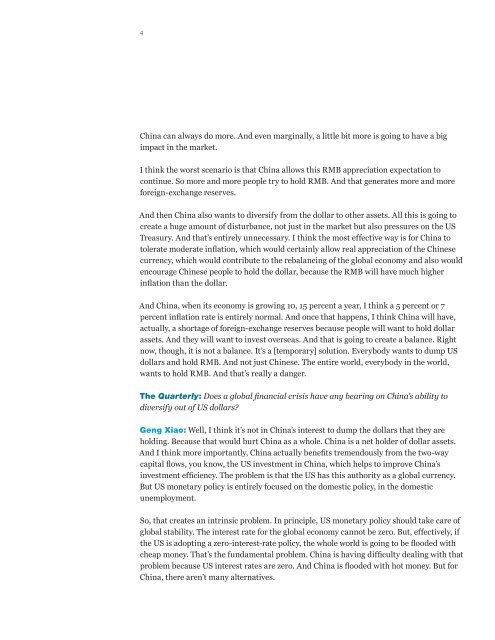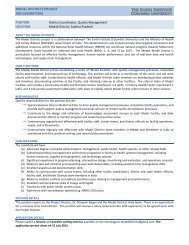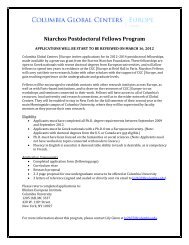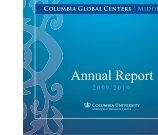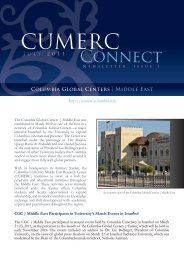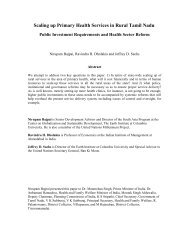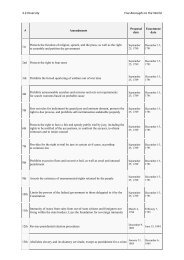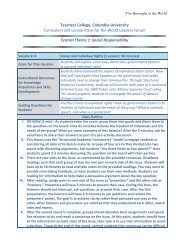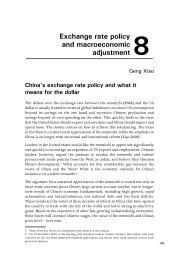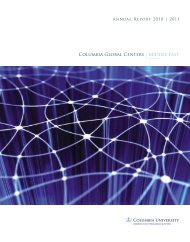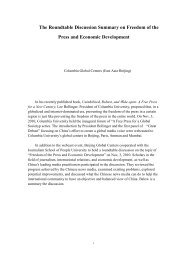Is the Renminbi the Next Global Currency, McKinsey - Columbia ...
Is the Renminbi the Next Global Currency, McKinsey - Columbia ...
Is the Renminbi the Next Global Currency, McKinsey - Columbia ...
Create successful ePaper yourself
Turn your PDF publications into a flip-book with our unique Google optimized e-Paper software.
4<br />
China can always do more. And even marginally, a little bit more is going to have a big<br />
impact in <strong>the</strong> market.<br />
I think <strong>the</strong> worst scenario is that China allows this RMB appreciation expectation to<br />
continue. So more and more people try to hold RMB. And that generates more and more<br />
foreign-exchange reserves.<br />
And <strong>the</strong>n China also wants to diversify from <strong>the</strong> dollar to o<strong>the</strong>r assets. All this is going to<br />
create a huge amount of disturbance, not just in <strong>the</strong> market but also pressures on <strong>the</strong> US<br />
Treasury. And that’s entirely unnecessary. I think <strong>the</strong> most effective way is for China to<br />
tolerate moderate inflation, which would certainly allow real appreciation of <strong>the</strong> Chinese<br />
currency, which would contribute to <strong>the</strong> rebalancing of <strong>the</strong> global economy and also would<br />
encourage Chinese people to hold <strong>the</strong> dollar, because <strong>the</strong> RMB will have much higher<br />
inflation than <strong>the</strong> dollar.<br />
And China, when its economy is growing 10, 15 percent a year, I think a 5 percent or 7<br />
percent inflation rate is entirely normal. And once that happens, I think China will have,<br />
actually, a shortage of foreign-exchange reserves because people will want to hold dollar<br />
assets. And <strong>the</strong>y will want to invest overseas. And that is going to create a balance. Right<br />
now, though, it is not a balance. It’s a [temporary] solution. Everybody wants to dump US<br />
dollars and hold RMB. And not just Chinese. The entire world, everybody in <strong>the</strong> world,<br />
wants to hold RMB. And that’s really a danger.<br />
The Quarterly: Does a global financial crisis have any bearing on China’s ability to<br />
diversify out of US dollars?<br />
Geng Xiao: Well, I think it’s not in China’s interest to dump <strong>the</strong> dollars that <strong>the</strong>y are<br />
holding. Because that would hurt China as a whole. China is a net holder of dollar assets.<br />
And I think more importantly, China actually benefits tremendously from <strong>the</strong> two-way<br />
capital flows, you know, <strong>the</strong> US investment in China, which helps to improve China’s<br />
investment efficiency. The problem is that <strong>the</strong> US has this authority as a global currency.<br />
But US monetary policy is entirely focused on <strong>the</strong> domestic policy, in <strong>the</strong> domestic<br />
unemployment.<br />
So, that creates an intrinsic problem. In principle, US monetary policy should take care of<br />
global stability. The interest rate for <strong>the</strong> global economy cannot be zero. But, effectively, if<br />
<strong>the</strong> US is adopting a zero-interest-rate policy, <strong>the</strong> whole world is going to be flooded with<br />
cheap money. That’s <strong>the</strong> fundamental problem. China is having difficulty dealing with that<br />
problem because US interest rates are zero. And China is flooded with hot money. But for<br />
China, <strong>the</strong>re aren’t many alternatives.


